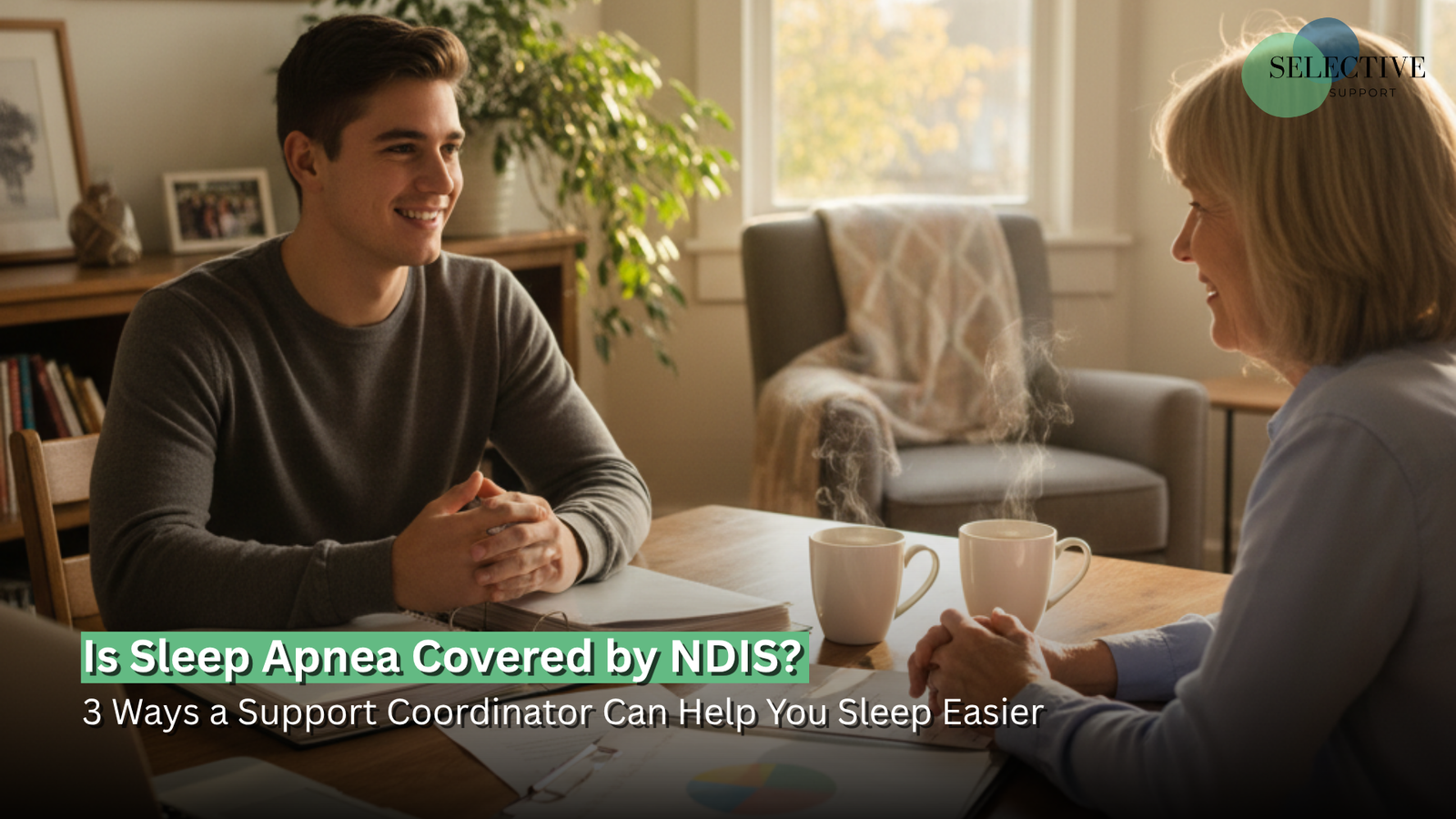Is Sleep Apnea Covered by NDIS? 3 Ways a Coordinator Helps
Have you ever laid in bed at 3am, wide awake, struggling to breathe comfortably and wondered if the NDIS can actually help with that? If so, you’re not alone. Sleep apnea affects many Australians, and for people living with a disability, it can make daily life even harder.
So, is sleep apnea covered by NDIS? The answer is yes, but only in certain cases. In this blog, we’ll unpack what’s possible, how sleep issues can relate to your NDIS plan, and most importantly, how a Support Coordinator can help you access what you need without the stress or confusion.
Is Sleep Apnea Covered by NDIS for People with a Disability?
The NDIS doesn’t cover every medical condition on its own. But if you have a diagnosed disability that’s impacted by sleep apnea, there may be support available.
For example, if your sleep apnea worsens symptoms of a psychosocial disability, neurological condition, or other physical disabilities, then the NDIS may consider funding supports that are reasonable and necessary.
These supports might include:
- CPAP machines
- Sleep assessments
- Occupational therapy
- Support from allied health professionals
To be eligible, the support must help you manage your disability or increase your independence.
What Sleep Apnea Supports Can Be Included in Your NDIS Plan?
How NDIS Plan Coordinators Help Identify Relevant Supports
Do you know what’s actually written in your NDIS plan? Many participants we work with don’t, and that’s okay. Your NDIS plan coordinator can walk you through it, line by line, and look for ways sleep-related supports might be included.
In fact, sleep-related breathing disorders like obstructive sleep apnea affect an estimated 9% to 38% of adults, depending on age and health conditions and yet, many go undiagnosed or unsupported through formal systems.
If your sleep apnea contributes to fatigue, anxiety, or a lack of daily function, a coordinator can help frame that in your plan’s context. For example, if broken sleep impacts your ability to attend therapy or engage with the community, that becomes a functional issue and worth raising.
Sleep disruption has been linked to higher rates of depression, poor concentration, and difficulty managing daily tasks, all of which can significantly affect your goals as an NDIS participant.
At Selective Support, we listen closely to understand the whole picture, not just the paperwork.
Equipment and Therapy You May Be Able to Access
If your sleep apnea is linked to your NDIS disability, here are some supports your plan may be able to include:
- CPAP machines: When directly related to your disability and backed by clinical reports
- Occupational therapy: To help build bedtime routines or manage anxiety impacting sleep
- Psychology sessions: To address related mental health struggles
- Sleep studies: If recommended by a GP or specialist and shown to improve function
Coordinators can also help you collect supporting letters, referrals, or assessments needed to justify funding these supports.
In Australia, over 134,000 people underwent diagnostic sleep studies in a single year, showing just how essential proper assessment and equipment are for managing sleep conditions effectively.
3 Ways Support Coordination Helps You Access Sleep Apnea Support
1. Understanding Your NDIS Plan and Eligibility
Still feeling unsure what your plan actually covers? You’re not alone.
Support coordination is about more than just booking appointments. A skilled Support Coordinator helps you:
- Understand what supports are already funded
- Identify gaps or needs around your sleep health
- Link sleep apnea to your functional capacity
For example, Oliver, one of our clients, struggled with severe fatigue and mental fog from poor sleep. Together, we reviewed his plan and connected his psychosocial disability to the need for better rest. That helped justify therapy sessions focused on calming routines and managing sleep anxiety.
“When sleep apnea affects a person’s daily functioning, like their ability to attend therapy, manage their mood, or participate in community life, it becomes more than just a health issue. That’s when the NDIS can sometimes step in to support, and a skilled Support Coordinator can make sure the right evidence is gathered to show why the support is needed.”
– Selective Support Team
Not sure what’s covered in your plan? Get in touch with our friendly team at Selective Support, we’ll talk it through together.
2. Finding the Right Sleep and Health Providers
Having the right team around you can make all the difference.
Your Support Coordinator can:
- Recommend local sleep health specialists or allied health providers
- Help arrange assessments or therapy sessions
- Make sure providers understand the NDIS and your needs
This saves you hours of calls and paperwork, and gives you peace of mind knowing you’re in safe hands.
We work with trusted professionals across Melbourne who know how to support NDIS participants with sleep-related needs.

3. Supporting Plan Reviews or Change of Circumstances
Sometimes your needs change. That’s normal.
If your sleep issues have worsened, or your current plan doesn’t reflect what you need, your Support Coordinator can:
- Gather supporting evidence from your GP or specialist
- Help you write clear, goal-focused updates
- Advocate on your behalf during plan reviews
You don’t have to do this on your own. We’ll be beside you every step of the way.
Should You Speak to a Support Coordinator About Sleep Apnea?
If your sleep issues are affecting your daily life, it’s absolutely worth a conversation.
You don’t have to be sure about the funding rules, that’s our job to figure out with you. If your sleep apnea relates to your NDIS disability and is impacting your goals, wellbeing, or daily routine, we can help explore what’s possible.
Let’s chat. You don’t have to figure it all out alone.
You Deserve Rest and the Right Support
Sleep affects everything, your energy, your mood, your ability to live the life you want. And if your NDIS disability is making sleep harder, you shouldn’t have to navigate that alone.
With the right support coordination, you can:
- Understand if sleep apnea is covered by the NDIS
- Get help reviewing your plan and providers
- Feel confident and in control of your next steps
At Selective Support, we’re here to help you make sense of it all, one step at a time.
Ready to feel supported? Get in touch with Selective Support today.
Understanding Sleep Apnea: Common Questions Answered
1. What are the causes of sleep apnea?
Sleep apnea happens when your breathing repeatedly stops and starts during sleep. There are a few types, but obstructive sleep apnea (OSA) is the most common. It’s usually caused by the throat muscles relaxing too much and blocking your airway.
Common causes include:
- Being overweight or having a larger neck size
- Structural issues (like a narrow airway or enlarged tonsils)
- Family history of sleep apnea
- Smoking or alcohol use, which can relax throat muscles too much
- Some neurological conditions
For people with an existing NDIS disability, factors like muscle weakness, anxiety, or medication side effects can also contribute.
2. What are the warning signs of sleep apnea?
You might not know you have sleep apnea unless someone notices it during your sleep, but there are some daytime and night-time symptoms to watch out for.
Common warning signs include:
- Loud snoring or gasping for air during sleep
- Waking up choking or short of breath
- Dry mouth or sore throat in the morning
- Feeling tired even after a full night’s sleep
- Mood changes like irritability, low energy, or trouble focusing
If you notice a combination of these signs, especially if you already have a disability that affects your breathing, energy or sleep, it’s worth speaking to a GP or support coordinator.
3. How do I confirm if I have sleep apnea?
The only way to know for sure is through a diagnostic sleep study, often called a polysomnography. These tests track your breathing, oxygen levels, and sleep quality overnight.
Your GP can refer you for this, and if you’re already on the NDIS, a Support Coordinator can help you find a provider that understands your situation, and make sure any reports can be used to support your funding requests later on.


